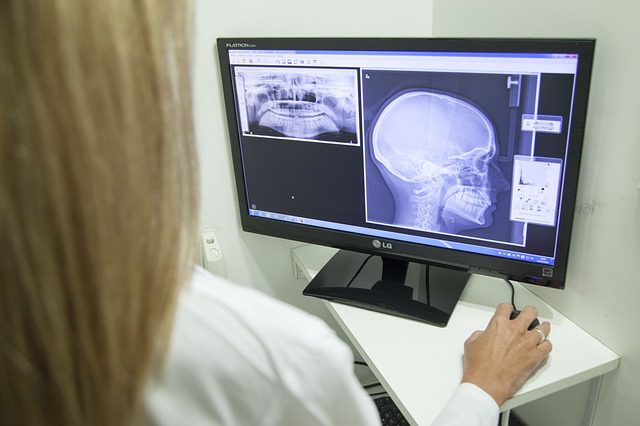A misaligned jaw, also referred to as a crooked or uneven jaw, is when your upper jaw doesn’t line up correctly with your lower jaw. Because the jaw relies on a system of soft and hard tissues to work together, an imbalance in any bone, muscle or joint can cause the jaw to come out of alignment. An uneven jaw varies from mild bite issues to severe misalignment that affects facial appearance.
The dangers of leaving a crooked jaw be are health and quality-of-life-related. Health risks include increased risk of cavities, gum disease and injury. Quality-of-life issues include an inability to chew or speak correctly, sleep problems, and damage to your self-confidence if the misalignment is visible.
Causes of a Crooked Jaw
There are several variables that can cause a jaw to become misaligned:
Genetic Disorders
Any condition you’re born with that affects orofacial structures, bone or muscle development can all cause an uneven jaw. This includes chromosomal disorders and cleft palate. The most common genetic disorders that cause uneven jaw development and other orofacial abnormalities include:
- Apert Syndrome
- Crouzon Syndrome
- Down Syndrome
- Freeman-Sheldon Syndrome
- Treacher Collins Syndrome
Dental problems
Dental problems are a common issue even if a child enjoys healthy development:
- Teeth come in crooked
- Unerupted teeth push others around
- Wisdom teeth complications
- Extra teeth
- Missing teeth
- Malocclusion
Other things like tongue thrusting and thumb sucking can also make it so your bite actually stops your jaw from being able to rest in an aligned position.
Disease
Health issues, especially chronic ones, negatively affect all systems in the body, and that includes bone. Some diseases/illnesses that can cause or contribute to an uneven jaw include:
- Bone cancer (osteosarcoma)
- Osteoarthritis
- Oral Cancer
- Paget’s disease of the bone
- Fibrodysplasia ossificans progressiva (FOP)
While some of these pathologies can be treated in order to mitigate or correct the jaw misalignment, others, like FOP, are unable to be treated.
Dislocation of the TMJ
The temporomandibular joint is the hinge that allows you to open and close your bottom jaw. TMJ disorder is often chronic and sometimes difficult to correct. It can cause complications with your bite via:
- Pain and inflammation in the jaw joint can lead to the jaw muscles becoming tight and contracted. This can cause the jaw to shift out of alignment.
- TMJ disorders can also cause the teeth to become misaligned, which can also lead to the jaw becoming crooked.
- Malocclusion, a misalignment of the teeth, can put stress on the TMJ joint, which can lead to pain and inflammation.
Facial trauma
Accidents like a baseball to the face, a physical fight, a car accident – anything that results in jaw trauma – can cause it to come out of alignment, fully dislocate, or even fracture. Jaw damage from facial trauma also has implications post-healing, as your mastic muscles may be used more and/or unevenly for your jaw to compensate for the injury.
Teeth grinding/clenching
Severe bruxism can put undue stress on the TMJ and back molars, which can cause the joint and the jaw to become uneven. This is a result of chronic inflammation. With any kind of repetitive stress injury, the body will do what it can to compensate, so in cases of chronic grinding and clenching, your jaw may actually change its shape to adjust to the constant stress.
Signs & Symptoms Your Jaw is Uneven
Symptoms of a crooked jaw overlap with symptoms of several other orofacial problems. If the jaw misalignment isn’t severe enough to physically see, it might be difficult to immediately identify it as the cause of your discomfort. Your oral surgeon can take a 360-degree x-ray of your mouth to determine if your jaw is out of whack. Symptoms include:
- A crooked facial appearance
- Clicking or popping in the jaw
- Ear popping
- Pain in the upper back and/or shoulders
- Pain near the temples and/or back of jaw
- Tight/locked jaw
Natural Methods for Correcting the Alignment of Your Bite
Often, an uneven jaw can be corrected via natural methods:
- Facial yoga/facial exercises can correct misalignments caused by a weak jaw and asymmetrical muscles.
- Massage therapy can relieve stressed and tight jaw structures, reduce inflammation and relieve pain.
- Acupuncture can ease inflammation and relax seized muscles, helping get your bite back in line.
- Your oral surgeon might also take a mold to create a retainer, mouth guard or splint to keep your jaw where it’s supposed to be once the misalignment has been corrected.
The key to these treatment methods is consistency on the part of the patient. You have to maintain the facial exercise regimen, visit your oral surgeon regularly to track treatment progression, and wear any installation like a splint diligently.
How an Oral Surgeon Intervenes in Jaw Problems
Unfortunately, non-invasive methods to realign a jaw aren’t applicable to every case. Crooked jaws caused by health issues, extreme facial trauma or congenital disorders might require maxillofacial surgery(ies) to correct.
- If your bite is simply misaligned, orthodontic treatments can move teeth into their correct positions.
- Congenital issues like cleft palates or malformed bones and joints can be corrected via maxillofacial surgeries that reconstruct the mouth so that the jaw aligns correctly.
- Facial trauma that results in jaw damage may require any number of procedures to splint the broken jaw in place, such as pins, plates and screws, dental bone grafting, wiring, and other orofacial procedures.
More severe jaw misalignments, naturally, take more time and an interdisciplinary approach to correct. Often, tooth extraction and replacement might be required, especially when the crooked jaw is caused by defects in facial structures and not injury or chronic stress. Sedation is also required for jaw surgeries, so a maxillofacial surgeon must take into account the patient’s health and risk level for anesthesia.
If you think you have a crooked jaw or are looking for an opinion on treatments for cleft palates or TMJ, contact a local oral and maxillofacial surgeon. There’s no reason to take risks with your health or live with an appearance you’re uncomfortable with when uneven jaws are completely treatable!








